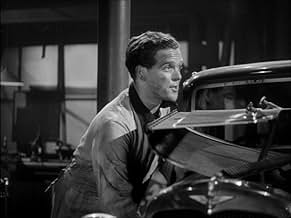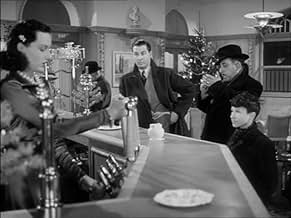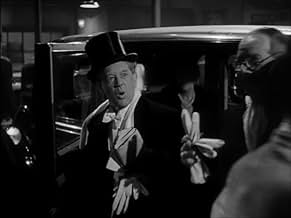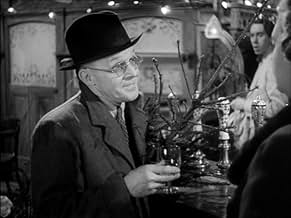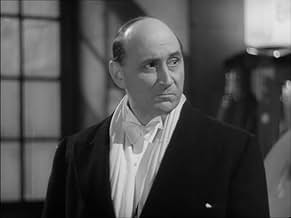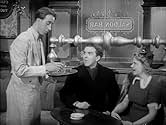Agrega una trama en tu idiomaAgainst Christmas backdrop, pub regulars led by bookie Joe Harris try to prove Eddie Graves' innocence before his scheduled execution for murder the next morning, as landlord awaits new baby... Leer todoAgainst Christmas backdrop, pub regulars led by bookie Joe Harris try to prove Eddie Graves' innocence before his scheduled execution for murder the next morning, as landlord awaits new baby.Against Christmas backdrop, pub regulars led by bookie Joe Harris try to prove Eddie Graves' innocence before his scheduled execution for murder the next morning, as landlord awaits new baby.
- Dirección
- Guionistas
- Elenco
O.B. Clarence
- Sir Archibald
- (as O. B. Clarence)
- Dirección
- Guionistas
- Todo el elenco y el equipo
- Producción, taquilla y más en IMDbPro
Opiniones destacadas
I watched an absolutely charming piece of British ensemble called of all things "Saloon Bar" (1940), with Gordon Harker, Mervyn Johns, Elizabeth Allan, Joyce Barbour, Anna Konstam, Cyril Raymond, Judy Campbell, and others (among whom is a very young pre-teen Roddy McDowall. Taking place basically in a single setting on Christmas Eve or thereabouts, in an evidently pre-war bar, the ostensible idea behind this piece is to save a young man from being hanged in the morning for a murder he didn't commit. But - how to prove it... This began as a play written by Frank Harvey (who also contributed to the screenplay) and then was put on the screen by Angus MacPhail and Jon Dighton. This is one of the four films on Volume 10 of the Ealing Studios Rarities series put out in Britain in the last few years (total of 14 volumes). Mervyn Johns sits on his bar stool during the entire film without moving, drinking, and making wry and sarcastic comments endlessly, deliciously. Elizabeth Allan is Queenie, a bar tending girl the hapless accused was seeing before his sentence. A competing bartendress from another establishment is Judy Campbell. The landlord of the bar where nearly all of the action takes place has an expectant wife upstairs, and it seems that she's been bearing first a boy, then a girl, then a boy, then a girl, in alternate years for some time now. Meanwhile, between endless quaffs of endless Lion ale, Gordon Harker is trying to figure out who really murdered the old lady the young man on death row is accused of killing. If all this sounds, perhaps, somewhat predictable, maybe even stagnant, or boring - trust me, it isn't in the least. It crackles with wit and wonderful acting and direction and atmosphere. It is indelibly British, the definition of it for Americans who think they know what that means, but who really don't. If you're into what pre-World War II Britain was like, this is the essence, a time and a culture that just doesn't exist anymore at all, but which is captured here in a water drop under the spyglass perfectly. Simply great!
That it was directed by Walter Forde and starred Gordon Harker led me to expect a comedy, and it's certainly played with tongue in cheek, as well as frequently earthy touches (the plot nonchalantly throwing in both prostitution and bigamy).
Obviously based on a play, it never leaves the studio, but the material is lively enough (and atmospherically photographed by Ronald Neame) for it not to matter.
The fact that the plot depends upon the novelty value of pound notes dates it (as does the barrel organ heard outside on the street); while the murder itself recalls the Oscar Slater case of 1908. Amidst the large cast, Harker, Mervyn Johns, Eliot Makeham and Felix Aylmer were plainly never young. But the film's age is also signalled by the extreme youth of Martin Clunes' father Alec (who died fifty years ago), Roddy McDowall popping up under an umbrella as a little boy singing carols; and Mavis Villers, still propping up a bar over twenty years later in 'Victim'.
Obviously based on a play, it never leaves the studio, but the material is lively enough (and atmospherically photographed by Ronald Neame) for it not to matter.
The fact that the plot depends upon the novelty value of pound notes dates it (as does the barrel organ heard outside on the street); while the murder itself recalls the Oscar Slater case of 1908. Amidst the large cast, Harker, Mervyn Johns, Eliot Makeham and Felix Aylmer were plainly never young. But the film's age is also signalled by the extreme youth of Martin Clunes' father Alec (who died fifty years ago), Roddy McDowall popping up under an umbrella as a little boy singing carols; and Mavis Villers, still propping up a bar over twenty years later in 'Victim'.
Supporting the rest of the reviews, this is a lovely little film, really worth watching (I've seen it twice). Indeed the story doesn't really matter, it is the pleasure of watching a tight knit cast who all seemed to be enjoying their work! Gordon Harker was brilliant as was Mervyn Johns, slightly out of the type of character he became better known for later in his career. There were no well known 'stars' just an ensemble of good character actors given a chance to shine.
The film, although released in 1940 is clearly set before the war as apart from anything else, all lights in the pubs were blazing away and there was no mention of the war and no sign of the blitz which started in September 1940.
A little light relief then and now!
The film, although released in 1940 is clearly set before the war as apart from anything else, all lights in the pubs were blazing away and there was no mention of the war and no sign of the blitz which started in September 1940.
A little light relief then and now!
From 1940, the British "Saloon Bar" takes place mostly in a couple of bars as characters work to save a friend from hanging. Their friend, Eddie (Alec Clunes), has been convicted of killing an old woman for her money. The money hasn't been found; however, a list of the serial numbers were submitted to pubs and stores.
One of the bills shows up at the bar. The group endeavors to find out where it came from - is that person perhaps the murderer?
Warm film that takes place around Christmastime and is complete with awful carolers, one of whom is little Roddy McDowall.
The cast includes Mervyn Johns, Gordon Harker, Roddy Hughes, Elizabeth Allan as the condemned man's girlfriend, Joyce Barbour, and Judy Campbell. Allan is quite beautiful - I wasn't really familiar with her until this film. The acting was all solid from veteran character actors.
Recommended.
One of the bills shows up at the bar. The group endeavors to find out where it came from - is that person perhaps the murderer?
Warm film that takes place around Christmastime and is complete with awful carolers, one of whom is little Roddy McDowall.
The cast includes Mervyn Johns, Gordon Harker, Roddy Hughes, Elizabeth Allan as the condemned man's girlfriend, Joyce Barbour, and Judy Campbell. Allan is quite beautiful - I wasn't really familiar with her until this film. The acting was all solid from veteran character actors.
Recommended.
This is a thoroughly enjoyable film, compulsive viewing for all who might enjoy drinking in the pre-War atmosphere of London in 1939 and early 1940 just before the Blitz. The film is based on a stage play, a kind of early 'Mousetrap' concept, a whodunnit essentially taking place in a single set. The atmosphere of this saloon bar, where the main characters congregate, is brilliantly conveyed. The film is stuffed full of delightful character actors all doing a great job. The film is well directed by Walter Forde, an experience old-timer, two of whose better known films are 'Rome Express' (1932) and 'Bulldog Jack' (1935). This is quintessentially English, and since things which are quintessentially English barely exist any more, the film has thus become an invaluable archaeological artifact. The film may not be 'multi-cultural', but it is certainly 'multi-social', as every class of society participates in the action and interacts in a manner which will be fascinating to social historians. My wife and I, as old friends of Judy Campbell, were delighted to see her performance in this classic as 'Doris of the Shakespeare', at which she thoroughly excelled as a rather embittered young barmaid from a rival pub. The lead character is an extroverted bookie, played by Gordon Harker, who takes the lead in trying to clear a friend of a murder charge for which he will be executed on the following morning. The condemned man's girlfriend, another barmaid, is played by Elizabeth Allan. She is far less charming than Judy. I sat next to her a couple of times at dinner when she was an old lady and found her vanity really too much to take. It shows in this film. Mervyn Johns is terribly funny in this film, glum and solemn as he sits on 'his stool' and will not get off it for any reason, making wry comments throughout all the action. While everything else is happening, a baby is being born, some scruffy kids are singing Christmas carols (12 year-old Roddy MacDowell amongst them), there is a parody of a feather-headed chorus girl ('he behaved like a perfect gentleman, he took his hands away as soon as I asked him'), and any number of amusing characters and incidents. What happens about the whodunnit aspects must remain a secret, but does not disappoint. This film is a real joy, and should be reissued on DVD so that people can see it.
¿Sabías que…?
- TriviaWhen the men are talking about bicycling, one of them asks another if he has been up to Herne Hill lately. This is a reference to the velodrome in that South London neighborhood, which is still operating.
- ConexionesReferences George Robey's Day Off (1918)
Selecciones populares
Inicia sesión para calificar y agrega a la lista de videos para obtener recomendaciones personalizadas
- How long is Saloon Bar?Con tecnología de Alexa
Detalles
- Tiempo de ejecución1 hora 16 minutos
- Color
- Mezcla de sonido
- Relación de aspecto
- 1.37 : 1
Contribuir a esta página
Sugiere una edición o agrega el contenido que falta

Principales brechas de datos
By what name was Saloon Bar (1940) officially released in Canada in English?
Responda

